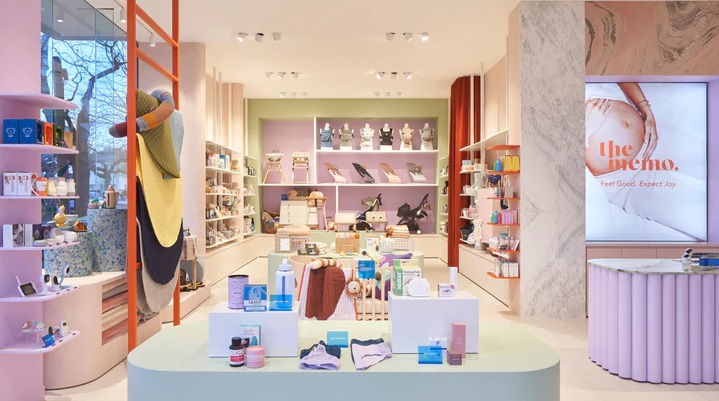The Memo was founded to take the pain out of shopping for baby goods, an experience that can often be overwhelming for first-time parents. Which products are really essential, and which ones are just gimmicks? “I felt very overwhelmed by the options, and I felt quite underwhelmed by the level of service and the experience,” Kate Casey, co-founder and CEO of The Memo, told Inside Retail about the experience of visiting big-box stores when she was pregnant. At the time, she was a b
as a brand manager at Mecca, so she understood the power of a highly curated and branded shopping environment, and a first-rate customer experience, but she felt like it didn’t exist in the baby goods category.
“There was a pin-drop moment, where I was like, ‘There isn’t a Mecca in the baby space’,” Casey recalled.
In 2019, she teamed up with The Blow founder Phoebe Simmonds to launch The Memo, an e-commerce site that stocks the best baby and maternity products on the market without any of the clutter, infantilising language and judgement that customers encounter elsewhere.
The Memo’s point of difference is its curated lists, which customers can use to ensure they have everything they need – and nothing they don’t. There are lists for pregnancy, what to bring to the hospital, and what to have at home – and customers can create their own lists, too.
“It’s all about simplifying the category and helping parents feel a lot better about their pregnancy, postpartum and parenting journey,” Simmonds told Inside Retail.
Now, after three years of strong online growth, the co-founders have opened their first bricks-and-mortar store in Armadale, an upmarket suburb of Melbourne, and they say it’s just the beginning.
“Hopefully, next year, we’ll get to open a couple more. Sydney is next on the cards,” Casey said.
All about the flow
Designed by leading Melbourne architecture and interior design firm, Cera Stribley, and built by The Melbourne Builder, the Armadale store features The Memo’s signature bright and bold colour scheme, while the layout has been thoughtfully planned with the customer in mind.
“What was really important to us was how the customer would actually experience that store. Rather than walking down an aisle of products that all look the same – how do you choose them? – flow was really important,” Casey said.
“You walk into the nursery area, and you can see all the different cots that we have available, you can think about the bed linen and mattress protectors you might need, what sleeping bag or swaddle, what monitor, if you need a nightlight…it’s all there.”
The store stocks The Memo’s best-selling products across each category. About 50 per cent of its total range is available in-store, but customers can browse the full range on iPads, and if they’d like to purchase something online, they can get free delivery.
Promotional tables near the entrance provide an opportunity for storytelling and to display collections that are being activated on the website, creating a cohesive omnichannel retail experience.
“My favourite part of the store is the health and recovery space, which you probably won’t find in the traditional retailers. It’s a category we’re very proud of,” Casey said.
Just a few years ago, it was hard to find items such as postpartum pads with witch hazel to soothe sore areas, and products that mimic the effects of cabbage leaves for mastitis. But more brands are starting to cater to the needs of new mums.
“Thankfully, there are products now to make women feel really supported through their postpartum journey…because things hurt and it is daunting,” Casey said. “Having to walk into a chemist and buy pads off-the-shelf and add the witch hazel yourself is pretty crap.”
New products and services
Having a physical space for customers to discover new products is important in the baby goods category, since many customers don’t have experience buying them.
“For a first-time parent, often you’re looking at products and you’ve got no idea what they are. What’s a Silverette? Why do you need a breast pump? Some people need to come and see it,” Casey said.
One cult product that is expected to drive a lot of foot traffic to the store is Snoo, a US$1300 smart bassinet that promises to give babies – and their parents – several extra hours of sleep a night. The Memo is the exclusive stockist of the brand in Australia, and the only place customers can see and trial the device before purchasing.
On the other end of the price spectrum, baby clothing is already generating a bigger proportion of sales in-store than it does online.
“Online, clothing is a nice category for us, but it’s really achieving some great results in-store because those outfits are just so cute,” Casey said.
Beyond discovering new products, services are a key part of The Memo’s store experience, something which Casey and Simmonds are passionate about based on their background in the beauty space.
“There’s a dedicated space where you can have a bespoke one-on-one gift registry appointment, and then we have a couple of lovely change rooms where we do bra fittings as a service,” Casey explained. “There’s even a space if you need to feed your baby.”
By women, for women
While The Memo is only three years old, it has already attracted investment from Hannah Fahour, the wife of former Australia Post managing director and current Latitude Financial CEO Ahmed Fahour, in exchange for a stake in the business, The Australian reported.
The Memo now employs around 15 people across the support office and warehouse, and most of them are mothers.
“They have been instrumental in helping us achieve the growth that we’ve been having,” Casey said.

